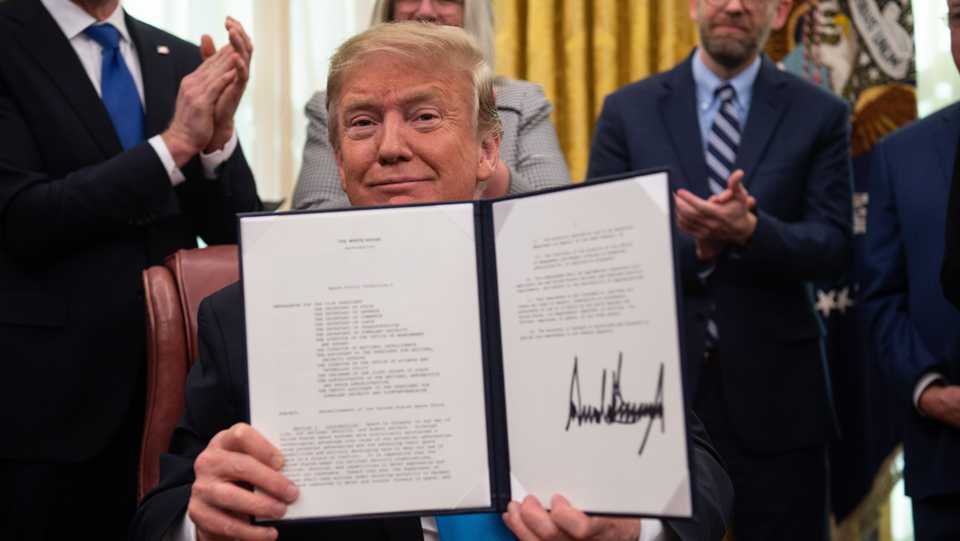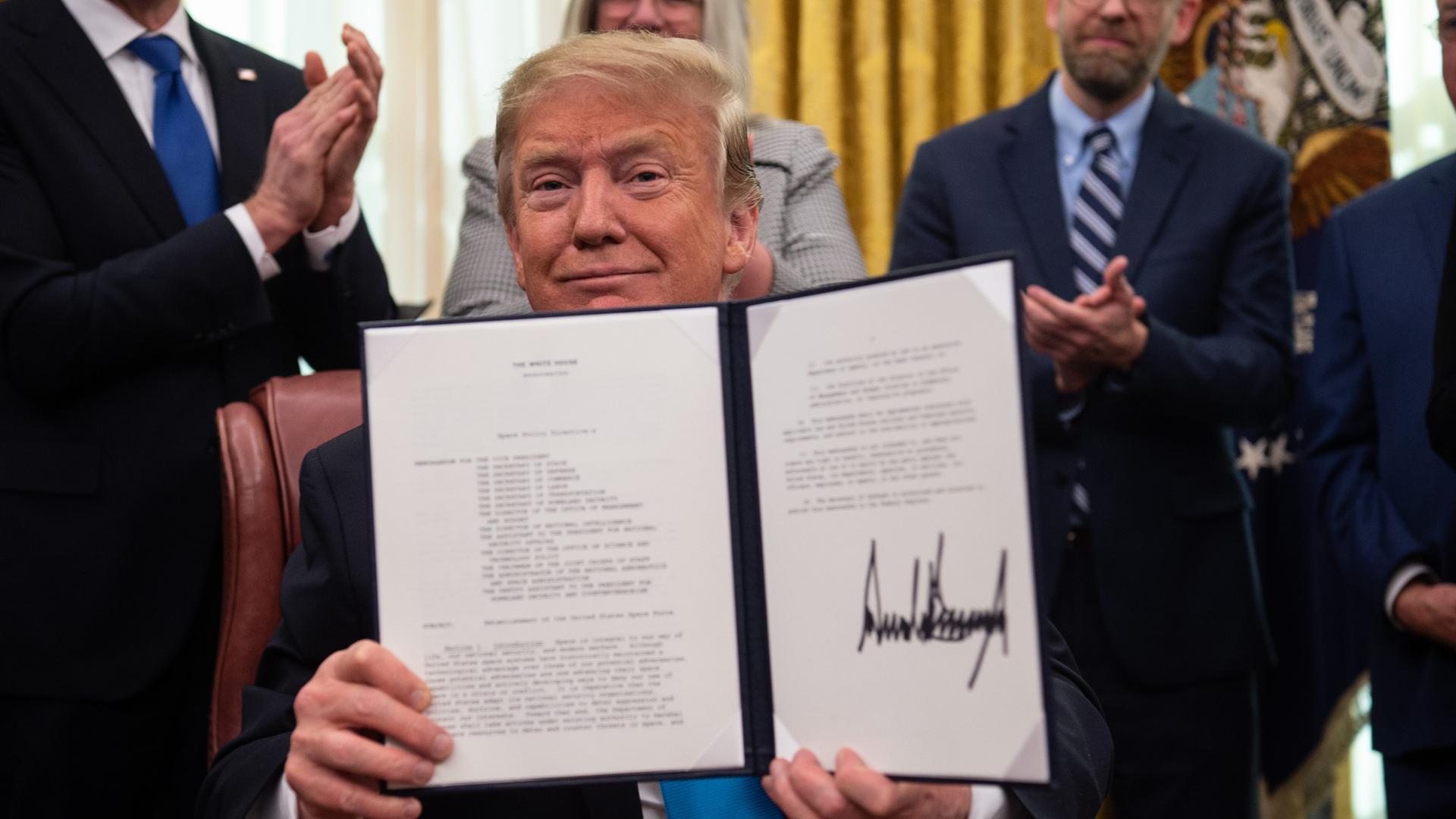
According to Gary Hufbauer and Jeffrey Schott, the history of economic sanctions dates back to 432 BC. When it comes to modern times, the US is the most prolific sanctioner in global affairs.
American policymakers have reached for the tool since almost the foundation of the country and the practice has accelerated under US President Donald Trump’s administration. The country’s willingness to use sanctions as a tool has irritated even some of its allies in Europe.
Vijay Prashad, an Indian historian and chief correspondent at Globetrotter, explains that the objectives of these sanctions are broadly to smother a country’s ability to trade and its access to finance if it does not bend to US will.
As of 2019, there are almost 8,000 sanctions in place. The US Treasury Department’s sanctions list starts with “Balkans-Related Sanctions” and keeps going till “Zimbabwe Sanctions”.
These are some of the most prominent sanctions the US has imposed:
1- Turkey:
The Republican-led Senate Foreign Relations Committee last week backed legislation to impose sanctions on Turkey because for its operation against the YPG, the Syrian branch of the PKK terrorist organisation, in Syria and for the purchase of a Russian S-400 missile system.
Trump has repeatedly stated that under former president Barack Obama’s administration the US refused Turkey’s demand to purchase the US-made Patriot missile system, with Washington choosing to ignore its ally’s needs and national interests and rebuffing Turkey’s overtures. However, recently it seems Washington wants to impose new sanctions against Turkey.
It is not the first time the US Senate has imposed sanctions against Turkey. By the 1960s tensions began to surface over Turkey’s intent to protect Cypriot Turks. During this period far-right agitators stoked tensions against the community and eventually seized control of the Mediterranean island in a 1974 military coup backed by Greece.
The US under President Lyndon Johnson had told Turkey in 1964 that it would not back any intervention by its military, nevertheless, Turkey responded after the coup by sending its forces to ensure the protection and rights of ethnic Turks in Cyprus who were at risk of ethnic cleansing.
Washington’s response was to impose sanctions limiting the Turkish army’s use of US-manufactured weaponry, implementing an arms embargo, and freezing aid.
Ankara responded in 1975 by limiting US use of Incirlik Air Base for NATO-related operations only, restoring full use in 1978 after the US congress voted to lift sanctions.
Currently, Turkey’s President Recep Tayyip Erdogan has mentioned that Turkey may close Incirlik, Kurecik bases ‘if necessary’ in response to potential future US sanctions against Turkey.
2- Cuba:
Cuba has been one of the longest sanctioned countries by the US. In 1958, the US imposed an arms embargo on Cuba during Fulgencio Batista’s term. When the Cuban Revolution ushered in a Communist government in 1962, President John F Kennedy extended the ban to all exports. Since then, the relationship between the two countries has been antagonistic.
In 2000, President Clinton permitted the sale of some farming equipment and medication for humanitarian reasons. In 2011, Obama eased the travel ban, intending to lift the entire embargo but his efforts were halted by Congress. When Trump became president, the government reimposed the travel ban.
3- Venezuela:
The US has imposed a total embargo on Venezuela, and the EU followed the US by imposing new sanctions on the oil-rich country. The main aim of the sanctions was to oust President Nicolas Maduro, but as is usually the case with sanctions, it is ordinary people that feel the brunt of sanctions.
The Trump administration openly supported the Venezuelan opposition leader, Juan Guaido. In January, Guaido unilaterally proclaimed himself as president and the US, and many EU countries were quick to recognise his claim.
Several foreign companies have suspended commercial activity with the country and Venezuela’s foreign accounts have been closed by Citibank.
Trump imposed an oil embargo in 2017 which prevented the purchase of petroleum from Venezuela’s state-owned oil company, PDVSA. The US also froze $5.5 billion of Venezuelan funds in international accounts in at least 50 banks and financial institutions.
The US has threatened foreign companies for doing business with the country.
4- Iran
After the Western-friendly Shah of Iran was toppled by the Iranian Revolution, a string of incidents, and most significantly the Iranian Hostage Crisis, kicked off a long tradition of US sanctions against Iran. The US first imposed a trade embargo to the country. Following ones included a near blanket ban on all economic activity with the country, rigid restrictions on everything from arms sales to oil exports, and wide-ranging travel bans on Iranian citizens.
In 2016, as a part of the Joint Comprehensive Plan of Action (JCPOA), sanctions on Iran were lifted following the international nuclear watchdog’s report which stated that the country had fully complied by limiting its nuclear ambitions and the deal was signed by Iran and Obama also including Germany, France, the United Kingdom, Russia, China and the European Union as signatories.
Trump promised to pull the US out of the deal during his election campaign and that’s exactly what he did after coming into power.
5- Russia
The US most recently imposed sanctions on Russian individuals, entities and vessels because of its invasion of Ukraine, its alleged attempted interference in the US election, human rights abuses, usage of chemical weapons and illegal trade with North Korea, as well as its support of Syria and Venezuela.
The sanctions against Russia include the blocking of assets subject to US jurisdiction; limits on access to the US financial system, and limiting transactions of US individuals and businesses involved with Russia.
6- China
The US under the Trump administration claimed it would no longer accept what it deems as China’s unfair trade restrictions on the importation of its goods and the stealing of intellectual property from US firms – which have helped China become a technology base.
The US has imposed several sanctions on China and blocked a group of Chinese technology companies from buying US-made goods on the grounds of alleged human rights abuses in Xinjiang Uighur Autonomous Region.
7 – The Ivory Coast
The West African country is being sanctioned by the US for human rights violations. Forty years ago, the Ivory Coast was home to one of the strongest economies built on coffee, cocoa and other exports. However, its economic decline in the 1980s and 1990s led to a number of civil wars.
The US imposed sanctions on any people and organisations involved in trade with those who provide arms or assistance to the country.










Discussion about this post